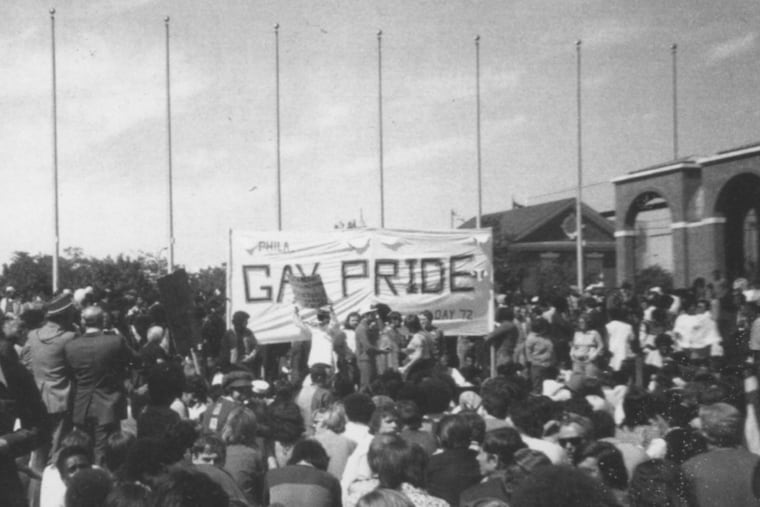At Philadelphia's first gay pride march, people were 'jeering at us and booing'
The organizers risked their jobs, lives, and safety to hold the 1972 march.

Philadelphia's Pride parade will celebrate its 30th anniversary this weekend, honoring the spontaneous march that unfolded in 1988 in Center City and eventually grew into the annual parade that celebrates the city's LGBT community.
But well before 1988, there was another — and perhaps, lesser-known — Pride march in Philadelphia.
It was in 1972, three years after police had raided the Stonewall Inn in New York City, sparking riots, days of protests and ultimately the gay-rights movement.
A group of gay and lesbian Philadelphians applied for a parade permit. The city wasn't too happy, as The Inquirer wrote at the time:
Tommi Avicolli Mecca was one of the people organizing the march. He had come out as a gay man the year prior, when he was 19 and a sophomore at Temple University.
Now 66 and living in San Francisco, Avicolli Mecca recalled that first Philadelphia march, his anxiety at the time and whether he feels his generation's work has been forgotten.
What was the climate like for Philadelphia’s LGBT community in 1972?
People thought nothing of discriminating against us. People thought nothing of putting us down. TV and the media barely really touched the topic.
Around election time, the police would raid the bars and people would be arrested. Back then your name and address would be published in the paper when you were arrested.
It was very much an atmosphere of fear. You kind of lived in fear that something could happen that would suddenly expose you.
How did the idea for Philly’s first pride march come about?
It's because New York was doing them, and we were all going up to New York for the pride marches.
The main job [in Philly] was just getting the word out and getting people to come.
I think it was our pride marches that helped get the media to start paying attention to us.
>> READ MORE: Philly Pride Parade: Drag queen Brittany Lynn teaches you how to create a make up look that will slay
What reactions did onlookers give when you marched?
We got some pretty negative reactions from people along the sides. I remember people jeering at us and booing, and people might have also been spitting. I don't know, it was kind of the reaction we expected.
Were you scared?
Oh yeah, of course. I grew up in South Philly, and I had gotten hassled when I was younger because I was always the effeminate kid, jumping rope with girls.
I feared that there would be violence [at the march], and I was afraid. I'm small: I'm 5'7″ and at the time probably weighed about 115 pounds. Of course I was worried that someone might attack me or something, but I think being around all those other folks gave me some little sense of safety and security. There were a lot of us.
I remember we had safety monitors. We had trained people to be watching and making sure there were no fights.
The marches continued through 1976, but then they stopped. Why?
The marches got smaller for some reason. The [Philadelphia Gay Pride] committee got smaller, but it's really, really, really hard to remember why. We didn't have any corporate sponsorship back then. We didn't have a whole lot of money … we didn't have politicians marching with us.
I know some of us lost the energy to keep doing it, and no one else stepped forward.
Do you fear Philadelphians have forgotten the work you and other gay activists did?
I do think people have forgotten a lot of what we did back then. When I'm out speaking, especially at colleges, people don't realize how much we did. They might have some little sense of, 'Oh yeah, those old folks got this whole thing started,' but they don't really understand that we were the ones who started Pride. There was no concept of Pride as a movement.
Acceptance of the LGBT community has come a long way since Philly’s first pride march. But what problems still exist?
The fact that we're still seeing so many murders of trans women of color every year. If you go outside the safe bubble of cities like San Francisco, New York, Philadelphia, there's still so much hatred.
You think you've some so far … but I guess it's like that for everybody who has been struggling. You have to keep fighting.